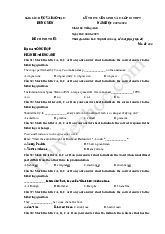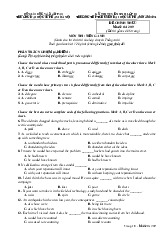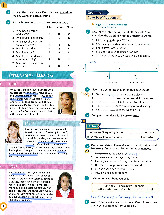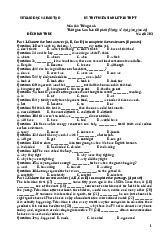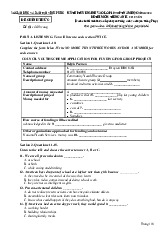










Preview text:
ĐỀ THI TIẾNG ANH VÀO LỚP 10
QUẬN BA ĐÌNH, HÀ NỘI CÓ ĐÁP ÁN
Mark the letter A, B, C or D on your answer sheet to indicate the correct answer to each of the
following questions.
Question 1. The man who was driving the truck would not admit that he had been at fault, and _______.
A. the other driver neither
B. neither had the other driver
C. neither would the other driver
D. neither the other driver
Question 2. Jack seldom has breakfast, _______?
A. doesn’t he B. has he C. hasn’t he D. does he
Question 3. You will spend at least six months working abroad _______ you can find out how things operate overseas. A. because B. as long as C. so as to D. so that
Question 4. As I was walking the street, I saw _______ 10 USD note on _______ pavement. A. a – a B. the – the C. a – the D. the – a
Question 5. Women these days prefer to be _______ independent. A. financing B. financially C. financial D. finance
Question 6. Teachers in modern classrooms are _______ because their main task is to set goals and
organise the learning process accordingly.
A. bread-winners
B. information providers
C. facilitators D. evaluators
Question 7. Cuc Phuong National Park, _______ we spent our last weekend, has over 200 square kilometres of rainforest. A. where B. that C. which D. when
Question 8. She turned _______ the job in New York because she didn’t want to move. A. off B. down C. up D. on
Question 9. If I were him, I _______ harder to pass the examination. A. would work B. will work C. work D. worked
Question 10. I suggest _______ a new architect who will understand what she wants. A. for finding B. she finds C. to find D. she find
Mark the letter A, B, C or D on your answer sheet to indicate the most suitable response to complete
each of the following exchanges.
Question 11. - Henry: Would you mind if I closed the windows? - Kristen: __________
A. No, no. Please do it. B. Yes, I would.
C. No, I don’t do it. D. What a question!
Question 12. - Kim: How about going to the cinema tomorrow night? - Jenny: __________
A. I’d love to, but I’m busy tomorrow.
B. Can you tell me why?
C. Is it a good idea? D. We can go by bus.
Read the following passage and mark the letter A, B, C or D on your answer sheet to indicate the
correct word or phrase that best fits each of the numbered blanks.
More than 80% of American high school students work at part-time jobs (13) ________ the
evenings, on weekends or in summer. These part-time jobs bring teenagers great advantages. One of
the benefits of the work is the students can learn the skills that will be useful for the rest of their lives.
When they work, they have to manage both the job and schoolwork. To be able to do so, they must be
very organized and able to keep a (14) ________ schedule. They also learn to cope with the job stress
apart from the stress of the schoolwork. Some of the most (15) ________ jobs include teaching,
nursing, and police work. These skills help prepare teenagers for their later careers. High school
students who work are easier to succeed as adults than those who enter the job market at a later age
with (16) ________ work experience. Teenagers want many expensive things: clothes, mp3 players,
trips with their friends, etc. Not all parents can afford them. And even if they can, the teens might not
really appreciate that money because they did not earn it. When teenagers (17) ________ money for
themselves, they know its true value and are less likely to spend it foolishly.
Question 13. A. at B. on C. by D. in
Question 14. A. insensitive B. sensibly C. sensible D. sensitively
Question 15. A. famous B. simple C. stressful D. comfortable
Question 16. A. many B. a lot of C. no D. much
Question 17. A. make B. work C. do D. produce
Mark the letter A, B, C or D on your answer sheet to indicate the sentence that is made from the given cues.
Question 18. I / look forward / make / own conical hat / Tay Ho village / Hue /.
A. I look forward to making my own conical hat in Tay Ho village in Hue.
B. I look forward to make my own conical hat in Tay Ho village in Hue.
C. I am looking forward to make my own conical hat in Tay Ho village in Hue.
D. I look forward making my own conical hat in Tay Ho village in Hue.
Question 19. Steven / feel / unwell / he / keep on / work /.
A. Despite feeling unwell, Steven kept on to work.
B. In spite of feeling unwell, Steven kept on working.
C. Although Steven felt unwell, he kept on to work.
D. Though Steven didn’t feel unwell, he kept on working.
Question 20. It / say / it / take / 365.256 days / Earth / orbit / Sun /.
A. It is said that it takes 365.256 days for the Earth to orbit the Sun.
B. It says that it take 365.256 days for the Earth to orbit Sun.
C. It said that it took 365.256 days for the Earth to orbit the Sun.
D. It was said that it takes 365.256 days for Earth orbiting the Sun.
Question 21. They / live / Moscow / before / they / move / London/.
A. They was living in Moscow before they moved to London.
B. They lived in Moscow before they had moved to London.
C. They had lived in Moscow before they moved to London.
D. They had lived in Moscow before they had moved to London.
Mark the letter A, B, C or D on your answer sheet to indicate the sentence that is CLOSEST in
meaning to each of the following questions.
Question 22. The woman was too weak to lift the basket.
A. The basket was too heavy for her to carry it.
B. The woman wasn’t strong enough to lift the basket.
C. The woman wasn’t so strong that she couldn’t carry it.
D. The basket was too light for her to carry.
Question 23. That is the forest; they are living and working in the forest.
A. That is the forest where they are living and working in it.
B. That is the forest what they are living and working.
C. That is the forest which they are living and working in.
D. That is the forest where they are living and working in.
Question 24. I haven’t tried this kind of food before.
A. This is the first time I had tried this kind of food.
B. I have tried this kind of food many times.
C. It’s a long time since I tried this kind of food.
D. This is the first time I have tried this kind of food.
Question 25. When there is so much traffic on the roads, it is sometimes quicker to walk than to go by car.
A. There is so much traffic these days that it is more pleasant to walk than to drive.
B. It is faster to walk than to drive in the heavy traffic at certain time of the day.
C. The traffic is always so heavy that you’d better walk to work; it’s quicker.
D. During rush hours, walking gives me much more pleasure than driving in the heavy traffic.
Mark the letter A, B, C or D on your answer sheet to indicate the word(s) OPPOSITE in meaning to
the underlined word(s) in each of the following questions.
Question 26. They left their first temporary home last week when the overcrowded camp ran out of fresh water and space. A. country B. permanent C. expensive D. familiar
Question 27. My father doesn’t like politics. He doesn’t pay attention to political problems and current events. A. understand B. care C. ignore D. consider
Read the following passage and mark the letter A, B, C, or D to indicate the correct answer to each
of the questions.
Your mind’s ability to bring back experiences you have had is your memory. There are two
kinds of remembering, recall and recognition. For instance, you may not be able to recall the poem you
read yesterday, but if you see it again, you will know it instantly because you recognize it.
Some few people have “total recall”, often spoken of as photographic memory. A person with
total recall can recite a whole page of a book he has read only once. This is very unusual, however, and
most people have difficulty in remembering even the names they heard the day before. This is not
because most people have a lack of the ability to remember, but because they had not paid much
attention to what they heard. They felt no personal reasons to remember. Having a personal reason for
remembering is one of the most important factors in a good memory.
When you have a strong reason for remembering, concentrate as you read or listen, and try to
connect the new information to things you already know. A detail is easy to remember when it fits into
a whole that makes sense. If you understand the entire history lesson before you try to remember
particular dates, your memory may surprise you.
Question 28. This article as a whole tells us about ____________.
A. recognition as one way to remember things
B. people who can’t remember names
C. your memory and how you may improve it
D. people who can remember whole pages
Question 29. A person with photographic memory ____________.
A. can only remember things if he looks at a photograph
B. can be found in mental hospitals
C. brings his camera everywhere he goes
D. can remember every detail of what he sees or hears
Question 30. One way to improve your memory is ____________.
A. to concentrate on what you listen or read
B. to have a camera with you all the time
C. to ask other people to repeat something again and again
D. to learn everything you read or hear by heart
Question 31. Which of the following is NOT true according to the passage?
A. Most people lack the ability to remember.
B. A person can remember things better if he has a strong reason for doing it.
C. Your memory is your ability to bring back experiences you have had.
D. Recognition and recall are the two kinds of memory.
Question 32. The word "lack" in the passage is closest in meaning to ____________. A. presence B. need C. shortage D. sufficiency
Mark the letter A, B, C or D on your answer sheet to indicate the word(s) CLOSEST in meaning to
the underlined word(s) in each of the following questions.
Question 33. I don’t have any siblings since I am the only child. A. last B. one C. sole D. first
Question 34. She got the highest score in her class on the final exam, so she was very content with the results. A. unhappy B. satisfied C. proud D. mad
Mark the letter A, B, C or D on your answer sheet to indicate the word that differs from the other
three in the position of primary stress in each of the following questions. Question 35. A. confusion B. pollution C. engineer D. appliance Question 36. A. event B. remind C. lantern D. desire
Mark the letter A, B, C, or D to indicate the underlined part that needs correction in each of the
following questions.
Question 37. The money raised in the book fair will use to help those in need in remote areas. A. The B. help C. areas D. will use
Question 38. Phong Nha - Ke Bang National Park is one of the world’s two larger limestone regions. A. is B. of C. larger D. regions
Mark the letter A, B, C or D on your answer sheet to indicate the word whose underlined part differs
from the other three in pronunciation in each of the following questions. Question 39. A. destroy B. resource C. prepare D. decorate Question 40. A. laughed B. amused C. cooked D. increased ĐÁP ÁN
Mark the letter A, B, C or D on your answer sheet to indicate the correct answer to each of the
following questions.
Question 1. The man who was driving the truck would not admit that he had been at fault, and _______.
A. the other driver neither
B. neither had the other driver
C. neither would the other driver
D. neither the other driver
Question 2. Jack seldom has breakfast, _______?
A. doesn’t he B. has he C. hasn’t he D. does he
Question 3. You will spend at least six months working abroad _______ you can find out how things operate overseas. A. because B. as long as C. so as to D. so that
Question 4. As I was walking the street, I saw _______ 10 USD note on _______ pavement. A. a – a B. the – the C. a – the D. the – a
Question 5. Women these days prefer to be _______ independent. A. financing B. financially C. financial D. finance
Question 6. Teachers in modern classrooms are _______ because their main task is to set goals and
organise the learning process accordingly.
A. bread-winners
B. information providers
C. facilitators D. evaluators
Question 7. Cuc Phuong National Park, _______ we spent our last weekend, has over 200 square kilometres of rainforest. A. where B. that C. which D. when
Question 8. She turned _______ the job in New York because she didn’t want to move. A. off B. down C. up D. on
Question 9. If I were him, I _______ harder to pass the examination. A. would work B. will work C. work D. worked
Question 10. I suggest _______ a new architect who will understand what she wants. A. for finding B. she finds C. to find D. she find
Mark the letter A, B, C or D on your answer sheet to indicate the most suitable response to complete
each of the following exchanges.
Question 11. - Henry: Would you mind if I closed the windows? - Kristen: __________
A. No, no. Please do it. B. Yes, I would.
C. No, I don’t do it. D. What a question!
Question 12. - Kim: How about going to the cinema tomorrow night? - Jenny: __________
A. I’d love to, but I’m busy tomorrow.
B. Can you tell me why?
C. Is it a good idea? D. We can go by bus.
Read the following passage and mark the letter A, B, C or D on your answer sheet to indicate the
correct word or phrase that best fits each of the numbered blanks.
More than 80% of American high school students work at part-time jobs (13) ________ the
evenings, on weekends or in summer. These part-time jobs bring teenagers great advantages. One of
the benefits of the work is the students can learn the skills that will be useful for the rest of their lives.
When they work, they have to manage both the job and schoolwork. To be able to do so, they must be
very organized and able to keep a (14) ________ schedule. They also learn to cope with the job stress
apart from the stress of the schoolwork. Some of the most (15) ________ jobs include teaching,
nursing, and police work. These skills help prepare teenagers for their later careers. High school
students who work are easier to succeed as adults than those who enter the job market at a later age
with (16) ________ work experience. Teenagers want many expensive things: clothes, mp3 players,
trips with their friends, etc. Not all parents can afford them. And even if they can, the teens might not
really appreciate that money because they did not earn it. When teenagers (17) ________ money for
themselves, they know its true value and are less likely to spend it foolishly.
Question 13. A. at B. on C. by D. in
Question 14. A. insensitive B. sensibly C. sensible D. sensitively
Question 15. A. famous B. simple C. stressful D. comfortable
Question 16. A. many B. a lot of C. no D. much
Question 17. A. make B. work C. do D. produce
Mark the letter A, B, C or D on your answer sheet to indicate the sentence that is made from the given cues.
Question 18. I / look forward / make / own conical hat / Tay Ho village / Hue /.
A. I look forward to making my own conical hat in Tay Ho village in Hue.
B. I look forward to make my own conical hat in Tay Ho village in Hue.
C. I am looking forward to make my own conical hat in Tay Ho village in Hue.
D. I look forward making my own conical hat in Tay Ho village in Hue.
Question 19. Steven / feel / unwell / he / keep on / work /.
A. Despite feeling unwell, Steven kept on to work.
B. In spite of feeling unwell, Steven kept on working.
C. Although Steven felt unwell, he kept on to work.
D. Though Steven didn’t feel unwell, he kept on working.
Question 20. It / say / it / take / 365.256 days / Earth / orbit / Sun /.
A. It is said that it takes 365.256 days for the Earth to orbit the Sun.
B. It says that it take 365.256 days for the Earth to orbit Sun.
C. It said that it took 365.256 days for the Earth to orbit the Sun.
D. It was said that it takes 365.256 days for Earth orbiting the Sun.
Question 21. They / live / Moscow / before / they / move / London/.
A. They was living in Moscow before they moved to London.
B. They lived in Moscow before they had moved to London.
C. They had lived in Moscow before they moved to London.
D. They had lived in Moscow before they had moved to London.
Mark the letter A, B, C or D on your answer sheet to indicate the sentence that is CLOSEST in
meaning to each of the following questions.
Question 22. The woman was too weak to lift the basket.
A. The basket was too heavy for her to carry it.
B. The woman wasn’t strong enough to lift the basket.
C. The woman wasn’t so strong that she couldn’t carry it.
D. The basket was too light for her to carry.
Question 23. That is the forest; they are living and working in the forest.
A. That is the forest where they are living and working in it.
B. That is the forest what they are living and working.
C. That is the forest which they are living and working in.
D. That is the forest where they are living and working in.
Question 24. I haven’t tried this kind of food before.
A. This is the first time I had tried this kind of food.
B. I have tried this kind of food many times.
C. It’s a long time since I tried this kind of food.
D. This is the first time I have tried this kind of food.
Question 25. When there is so much traffic on the roads, it is sometimes quicker to walk than to go by car.
A. There is so much traffic these days that it is more pleasant to walk than to drive.
B. It is faster to walk than to drive in the heavy traffic at certain time of the day.
C. The traffic is always so heavy that you’d better walk to work; it’s quicker.
D. During rush hours, walking gives me much more pleasure than driving in the heavy traffic.
Mark the letter A, B, C or D on your answer sheet to indicate the word(s) OPPOSITE in meaning to
the underlined word(s) in each of the following questions.
Question 26. They left their first temporary home last week when the overcrowded camp ran out of fresh water and space. A. country B. permanent C. expensive D. familiar
Question 27. My father doesn’t like politics. He doesn’t pay attention to political problems and current events. A. understand B. care C. ignore D. consider
Read the following passage and mark the letter A, B, C, or D to indicate the correct answer to each
of the questions.
Your mind’s ability to bring back experiences you have had is your memory. There are two
kinds of remembering, recall and recognition. For instance, you may not be able to recall the poem you
read yesterday, but if you see it again, you will know it instantly because you recognize it.
Some few people have “total recall”, often spoken of as photographic memory. A person with
total recall can recite a whole page of a book he has read only once. This is very unusual, however, and
most people have difficulty in remembering even the names they heard the day before. This is not
because most people have a lack of the ability to remember, but because they had not paid much
attention to what they heard. They felt no personal reasons to remember. Having a personal reason for
remembering is one of the most important factors in a good memory.
When you have a strong reason for remembering, concentrate as you read or listen, and try to
connect the new information to things you already know. A detail is easy to remember when it fits into
a whole that makes sense. If you understand the entire history lesson before you try to remember
particular dates, your memory may surprise you.
Question 28. This article as a whole tells us about ____________.
A. recognition as one way to remember things
B. people who can’t remember names
C. your memory and how you may improve it
D. people who can remember whole pages
Question 29. A person with photographic memory ____________.
A. can only remember things if he looks at a photograph
B. can be found in mental hospitals
C. brings his camera everywhere he goes
D. can remember every detail of what he sees or hears
Question 30. One way to improve your memory is ____________.
A. to concentrate on what you listen or read
B. to have a camera with you all the time
C. to ask other people to repeat something again and again
D. to learn everything you read or hear by heart
Question 31. Which of the following is NOT true according to the passage?
A. Most people lack the ability to remember.
B. A person can remember things better if he has a strong reason for doing it.
C. Your memory is your ability to bring back experiences you have had.
D. Recognition and recall are the two kinds of memory.
Question 32. The word "lack" in the passage is closest in meaning to ____________. A. presence B. need C. shortage D. sufficiency
Mark the letter A, B, C or D on your answer sheet to indicate the word(s) CLOSEST in meaning to
the underlined word(s) in each of the following questions.
Question 33. I don’t have any siblings since I am the only child. A. last B. one C. sole D. first
Question 34. She got the highest score in her class on the final exam, so she was very content with the results. A. unhappy B. satisfied C. proud D. mad
Mark the letter A, B, C or D on your answer sheet to indicate the word that differs from the other
three in the position of primary stress in each of the following questions. Question 35. A. confusion B. pollution C. engineer D. appliance Question 36. A. event B. remind C. lantern D. desire
Mark the letter A, B, C, or D to indicate the underlined part that needs correction in each of the
following questions.
Question 37. The money raised in the book fair will use to help those in need in remote areas. A. The B. help C. areas D. will use
Question 38. Phong Nha - Ke Bang National Park is one of the world’s two larger limestone regions. A. is B. of C. larger D. regions
Mark the letter A, B, C or D on your answer sheet to indicate the word whose underlined part differs
from the other three in pronunciation in each of the following questions. Question 39. A. destroy B. resource C. prepare D. decorate Question 40. A. laughed B. amused C. cooked D. increased
